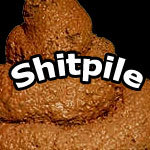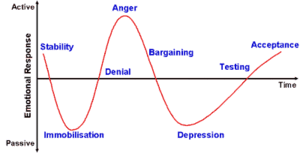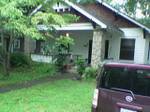Markets are a lot like alcoholics. They can’t start their recovery until they hit bottom.
In an auction market, like stocks, this happens fairly quickly. The buyers disappear, and sellers capitulate, those who were burned by the bubble lick their wounds.
The bottom is not reached until you have an honest "buying opportunity," based on fundamentals, usually at a valuation of about half what the commodity was worth before — often less. Often this bottom will be tested, and for years after a bust your gains will be modest, even if you got what looked at the bottom like a bargain.
Trouble is homes are not an ordinary market. They are not liquid
like stocks. They’re nearly always leveraged to the hilt. Even a
"solid" buyer is borrowing 4 of every 5 dollars they’re putting down.
It’s like buying stock on margin, and every stock picker knows that
bubbles based on margin pop spectacularly.
I have been saying for some time that we won’t hit bottom with
residential real estate until prices fall to about 50% of their highs,
and we’re nowhere near there — we’re still in the bargaining stage of
this grieving process. The Fed chairman urges banks to take their haircuts up-front
(easy for baldy to say) in order to give buyers "skin in the game" so
they’ll keep making mortgage payments. James Surowiecki of The New
Yorker suggests more people should be renting — that is going to happen anyway since foreclosed buyers have to live somewhere.
The standard grieving process goes through a definite series of stages (above),
and it’s clear from today’s headlines that depression is still ahead of
us. All the proposals I’ve heard — whether from Wall Street, the Fed,
from politicians — still fail to accept that, regardless of the pain,
prices must adjust to the real market before we can hope for new growth.
It’s easy to see why this is true. Think about a typical, sound
buyer, who spent $500,000 on their dream home. Maybe they put a solid
10% down, maybe they have a fixed-rate mortgage. I’m telling this buyer
that they’re going to be underwater by $200,000 before this is over,
that is, they’ll be paying on $450,000 worth of equity for a home
that’s really worth $250,000.
If you’d bought stock like this, borrowing 90% of the money, losing half your equity, you would get a margin call at $450,000 and, by $400,000, have been liquidated out of your position by the broker. In housing, however, you hold and pray for someone to bail you out.
But that’s not the way the market works. And that’s
why policymakers and investors were such shits allowing this bubble to
happen in the first place. They lied to you, Buddy. That home was never
worth $500,000, not really. As a place to live, it
might be worth its replacement cost a few years after the market
re-adjusts — that’s what happened in the 1970s.
Yet here in Atlanta I’m still seeing new construction. I’ve got some
teardowns happening just a few blocks from where I live. New homes
priced at $700,000, in a neighborhood where you can buy a nice little
fixer-upper for $150,000 — and that price is inflated.
All the Bush Administration is hoping to do at this point is push
the depression stage of the process out to the next Administration. They’re not serious about seeing this problem solved.
Any bail-out of the
banks, or the homebuyers, means printing dollars and placing these
losses onto the rest of us, those who played by the rules and didn’t
speculate. That’s what the so-called "conservatives" are trying to do
right now, and since they still hold all the power they’ll probably do it.
But when they do it, they’re killing their movement for all time.
Because taking the peoples’ money and giving it to someone else isn’t
conservatism. It’s communism. Once we have that recognition we’ll
finally be at the acceptance stage, and ready for a rebound. Not
before.














good article
thank you for informations.
good article
thank you for informations.
“I’m telling this buyer that they’re going to be underwater by $200,000 before this is over, that is, they’ll be paying on $450,000 worth of equity for a home that’s really worth $250,000.”
This wouldn’t be so dire if the Fed actually allowed interest rates to readjust naturally to compensate. The monthly payment on a $450k loan at a 30yr/6%APR is $2,700. The monthly payment on a $250k loan at 30yr/12%APR is nearly $2,600. One could also argue that raising the prime would help bolster people’s savings against the falling dollar. So, why did the Fed just cut interest rates? clearly it was not to help the more responsible amongst us . . .
Certainly, I don’t suggest that we say the hell with liquidity and just let interest rates do what they will (that certainly has not worked in the past). However, there must be some sort of middle ground. Having certificates of deposit paying less than the inflationary rate is not the right way to go. Did we put Goldfinger in charge of the Fed?
“I’m telling this buyer that they’re going to be underwater by $200,000 before this is over, that is, they’ll be paying on $450,000 worth of equity for a home that’s really worth $250,000.”
This wouldn’t be so dire if the Fed actually allowed interest rates to readjust naturally to compensate. The monthly payment on a $450k loan at a 30yr/6%APR is $2,700. The monthly payment on a $250k loan at 30yr/12%APR is nearly $2,600. One could also argue that raising the prime would help bolster people’s savings against the falling dollar. So, why did the Fed just cut interest rates? clearly it was not to help the more responsible amongst us . . .
Certainly, I don’t suggest that we say the hell with liquidity and just let interest rates do what they will (that certainly has not worked in the past). However, there must be some sort of middle ground. Having certificates of deposit paying less than the inflationary rate is not the right way to go. Did we put Goldfinger in charge of the Fed?